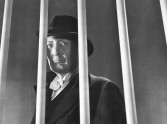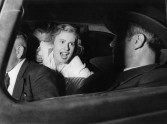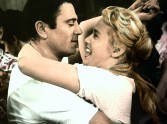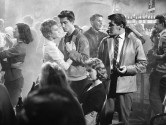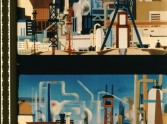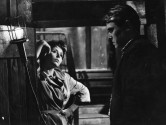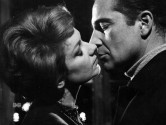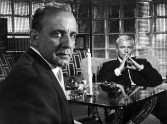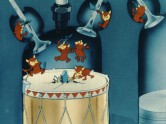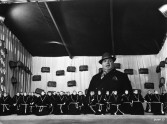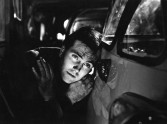
Mapping Gray Zones.
The Inexact Beauty of Early West German Cinema, 1949 – 1963
Avant-garde Shorts
Screening on Film
Avant-garde is a word rarely used in discussions of 50s West German cinema, which at first seems absurd considering that so much of the young nation’s most interesting works of art would qualify as experimental and pioneering. That said, save for the painter-sculptor-inventor-“occasional chemist” Franz Schömbs (who actually built his own optical bench—called the Integrator—for Opuscula!), there were no other filmmakers who devoted their time and energies to the creation of works formally challenging and nothing but. This doesn’t mean directors weren’t experimenting like mad, just not as l’art pour l’art but, rather, in the context of other genres. For instance, Neue Kunst – Neues Sehen is a documentary about modern art that lends its formal strategies from the works and artist presented; Der Wundertisch starts as a popular educational documentary on editing that ends in a hand-painted abstract film (made for the main part in 1943!); the animated commercial Alles für alle perplexes and enchants through its jazzy mix of styles and tones, while Die Purpurlinie delights with its cheekily surreal imagination; Das magische Band, finally, made in praise of BASF-manufactured magnetic tape, is a playfully essayistic piece of meta-cinema on time and memory.
Jennifer Lynde Barker is Associate Professor, Chair of the English Department, and Director of Film Studies Minor, Bellarmine University. Author of The Aesthetics of Antifascist Film: Radical Projection (Routledge, 2012), she has published in a number of journals and book collections.
PROGRAM
-
New Art – New Vision (Neue Kunst – neues Sehen)
Directed by Ottomar Domnick.
West Germany, 1950, 35mm, color, 10 min.
German with English subtitles.
Print source: SWR Media Services GmbH.Opuscula
Directed by Franz Schömbs.
West Germany, 1946-52, 16mm, color, 5 min.
Print source: Deutsches FilminstitutThe Miracle Table (Der Wundertisch)
Directed by Herbert Seggelke.
West Germany, 1954, 35mm, color, 10 min.
German with English subtitles.
Print source: BundesarchivEverything for Everybody (Alles für alle)
Directed by Hans Fischerkösen.
West Germany, 1955, 35mm, color, 4 min.
Print source: Bundesarchiv
The Magic Tape (Das magische Band)
Directed by Ferdinand Khittl.
West Germany, 1959, 35mm, color, 21 min.
Print source: Deutsche KinemathekThe Purple Line (Die Purpurlinie)
Directed by Florenz von Nordhoff.
West Germany, 1959, 35mm, color, 14 min.
Print source: Deutsches FilminstitutPart of film series

